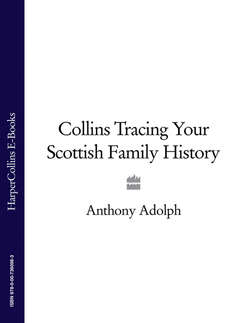Читать книгу Collins Tracing Your Scottish Family History - Ryan Tubridy, Anthony Adolph - Страница 25
Patronymics
Оглавление‘Mac’ followed by a personal name means ‘son of x’. This patronymic is the commonest form of Scottish surname. MacLaren, for example, means ‘son of Laren’. There are often traditions associated with the original namesake: Laren was an abbot of Achtow in Balquhidder, and the MacArthur’s original Arthur was said to be King Arthur himself: an unlikely tale! But in many cases, the namesake belongs to one of the genuine, ancient, interconnected pedigrees of the Viking and Dalriadan kings (see pedigrees on pp. 196-7 and 200-1), thus turning a mere surname into the key to a vast amount of early genealogical lore.
The Gaelic ‘Mac’ is one of a handful of words common to languages worldwide, that may have been part of the original tongue of our earliest human ancestors. It appears, for example, in native American tongues as make (‘son’); in New Guinea as mak (‘child’); and in Tamil as maka (‘child’). When you address someone as ‘Mac’, you’re using a word that, in all probability, your 180,000 x great-grandparents would have understood. M’ and Mc are contractions of Mac, found in both Ireland and Scotland – it is a myth that Scots only used Mc and the Irish Mac: the spellings are completely interchangeable in both countries.
People might use one or more patronymic. If Angus’s father Donald was the son of Ewan, then he became Angus Mac Donald Mac Ewan. In proper Gaelic, the second and subsequent ‘Mac’s are in the genitive case, so are spelled ‘Mhic’ and pronounced ‘Vic’, and are sometimes transliterated thus too. So, you may find Angus mac Donald mhic Ewan, or Angus mac Donald vic Ewan, all meaning ‘Angus son of Donald son of Ewan’. Throw in some mishearing and Gaelic renderings of the names, and you may have to spend some time deciphering: a rental from Rodel, Harris in 1690 names Angus Mc Coill vic Ewine, which Bill Lawson translates as ‘Angus MacDhomhnaill mhic Eoghainn’, i.e. Angus son of Donald the son of Ewen.
A painting by Swiss artist Johann Heinrich Fuessli (1741-1825) of Macbeth and Lady Macbeth, a Scottish name that Shakespeare made famous all round the world.
Sometimes, the system isn’t quite so clear as this, and there are cases where someone’s ‘patronymic’ will actually be the name of the person who brought him up, not his real father: all such cases where a foster-child takes its foster-father’s surname are confusing to genealogists.
Women had patronymics too: the female form of ‘Mac’ was ‘Nic’ or Ni’n’. Angus’s sister Morag may have been recorded as Morag ni’n Donald nic Ewan.
At this point you are probably thinking, ‘This is confusing because MacEwan is a surname, but you are saying here that it can also be simply a description of someone’s father or grandfather. So, was Donald Mac Ewan surnamed MacEwan, or simply the son of someone called Ewan?’
I’m afraid the system didn’t distinguish between the two, mainly because hereditary surnames arose in an entirely informal way in the first place. The MacEwan Clan descends from Ewan of Otter, Co. Argyll, who lived in the thirteenth century. His sons used Mac Ewan as a patronymic that also became a fixed surname. The male-line descendants had their own patronymics – Ian son of Dougal, etc. – and at the end of their list of ancestors they might or might not add their surname. Ian Mac Dougal
The Scottish Life Archive has rich resources for family historians. Many of its photographs depict named individuals. This picture, taken in Falkland, Co. Fife, in 1905, was taken by Andrew Venters in front of his grocery shop. The boy sucking his thumb was ‘W. Anderson’.
Mac Ewan might be Ian son of Dougal of Clan MacEwan clan, or simply someone who, as in our example above, was the grandson of a man called Ewan.
Worse, some patronymic surnames have come to be spelled in a certain way. The Clan MacKenzie are descended from a fourteenth-century Kenneth (Choinnich), who in turn descended from Gilleon na h-Airde, ancestor of the O’Beolan earls of Ross. Unfortunately, some registrars, knowing this and hearing someone saying that their father happened to be called Kenneth, would put them down as ‘MacKenzie’, when they weren’t of the Clan MacKenzie at all. A man whose father was a carpenter might be recorded as the literal translation, MacIntyre, even though he was not a member of the great Clan MacIntyre.
There is no easy solution, but there are some routes through the mire. In general, it’s sensible to assume that people using what appears to be a surname did so because it actually was their surname, particularly if that surname was common in the area. You just have to be prepared for the possibility that your research may reveal this not to have been the case.
